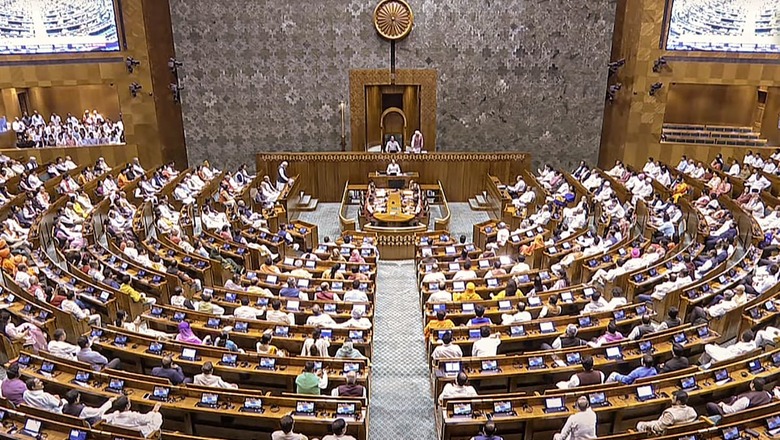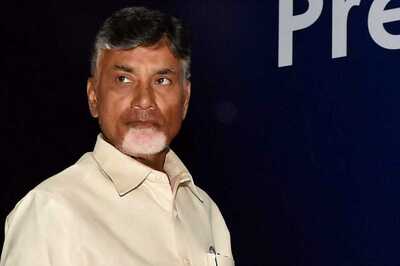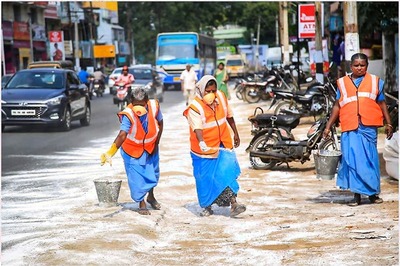
views
Today is an epochal day. Members of the Indian Parliament will literally “step out from the old to the new” as India renews its pledge to destiny on the floor of a brand-new Parliament House.
The earlier iconic building, envisaged by the British but built by the sweat and toil of Indians, will remain standing as an ever-lasting ode to a momentous midnight hour 75 year ago. India’s old Parliament building has, for most parts, admirably shepherded the world’s oldest and largest democracy through the vicissitudes of recent history.
Prime Minister Narendra Modi recognised this fact when he hailed the 7,500 parliamentarians who have till date ensured that the Sansad evolves into “a place of pilgrimage”. Much of the credit must undoubtedly go to the founders of the modern post-Independence Indian state. They, in the words of Sachchidananda Jha, the oldest member of the Constituent Assembly that was set up in 1946, urged fellow members to “justify the pride” that Indians take in the “immortality of the destiny of our great, historic, and ancient country”.
Jha’s message was not lost on the members of the Constituent Assembly who evolved the most extensive, practicable, justiciable, and republican constitutions ever written.
Today, as the members of Parliament take their seats in the new hall of the republic, they must undoubtedly ask themselves how they can better serve to augment the boundless agency of a Bharat that is on the cusp of superpower status.
If they are truly devoted to self-improvement, they might just resolve to right some wrong turns taken on the road to destiny.
First, the Constitution might have striven for inclusivity but sadly members of Parliament have over the years enabled a discriminatory secularism. Several legislations were passed in the name of upholding secularism that not only undermined the principle but also furthered a case for minority separatism.
Through the 42nd amendment, the Indira Gandhi government inserted the world “secular” into the preamble of the Constitution. The then Prime Minister chose to overlook that the Constitution’s drafting committee had counselled against the desirability of including the term. During the Constituent Assembly debates, Dr BR Ambedkar had deemed the call for inserting the word ‘secular’ into the Preamble a “superfluous matter”. Speaking as chairman of the drafting committee, Dr Ambedkar reminded his peers that, “what should be the policy of the State, how the Society should be organised in its social and economic sides are matters which must be decided by the people themselves according to time and circumstances. It cannot be laid down in the Constitution itself because that is destroying democracy altogether.”
Ambedkar was right. In any case, India’s polity was founded on an ancient and all-inclusive Hindu dharma; it was incomprehensible that the state would be anything but secular. Indeed, the Directive Principles of State Policy enshrined in the Constitution demand that the state should prescribe a non-compromising secularism by adopting a Uniform Civil Code. The idea was to bring down the architecture of personal religious codes that are known to impede societal uniformity and, thereby, national unity.
But what Dr Ambedkar didn’t account for was demagoguery. Indira Gandhi, playing to the galleries, used the cloak of the Emergency to insert the word ‘secular’, sanctifying the acts of preceding Congress administrations that championed pseudo-secularism through legislation.
Blurring the lines between “church and state”, Congress governments selectively codified only Hindu laws, extended state control over mainly Hindu places of worship and discriminated against the majority community by singling out minorities for state benefits.
Many legislative interventions were plainly politically expedient – the Places of Worship Act 1991, Parliament’s reversal of the Shah Bano judgement, The Waqf Act of 1995, The Haj Committee Act of 2002. Many of these laws only served to establish a “caste system among religions” and remain on the books to be exploited by political parties to communalise politics.
But thankfully, there’s reason to think that this misuse of Parliament to entrench otherness will soon be addressed.
There’s hope because today, on its first day of functioning in the new building, Parliament has demonstrated that it isn’t opposed to rectifying inequities. In a momentous show of solidarity, all political parties have resolved to address one of the greatest other inequities in India — the vastly privileged status of men over women. Parliament will finally pass the Women’s Reservation Bill brought by the Modi government to provide reservation to women in the Lok Sabha and state Assemblies.
This bill had been gathering dust for the last 27 years. But as the new Parliament building takes us into a new era of gender equality, its members will be aware of the distortions that disfigure their other legislative endeavours that have been aimed at delivering social justice. Parliament has long been a conduit for legislating quotas to address the other scourge that blights India’s image — casteism.
The drafters of the Constitution hoped that like the French revolution brought in liberty, the Russian revolution brought in equality, India’s democratic revolution would bring in fraternity. Towards this end, the Constitution enabled governments to pursue affirmative action through legislating quotas. But in an act of exceptional far-sightedness Dr BR Ambedkar, a Dalit himself, warned against perpetuation of caste quotas, believing legislation alone doesn’t change people.
As the chief of the drafting committee, Dr Ambedkar awarded himself the discretion of advocating a sunset clause for reservation quotas. However, Dr Ambedkar’s legatees in Parliament have instead entrenched caste by continually expanding the tent of reservations to include more and more segments of society. Quotas have undoubtedly brought the marginalised into the ambit of the formal state. But many sociologists now believe that quotas ad infinitum serve the ends of social justice less, becoming instead a means for political parties to consolidate their voter base.
The Chairman of the 21st Law Commission even went on record to say that reservations were not a fundamental right providing the elbow room to politicians to review their advocacy for them. Thus far, no political party has shown the will to do so.
A third area crying out for reform is how legislators have criminalised the liberty to dissent and freely express opinion. Beginning with Nehru, laws with arbitrary provisions were passed to throttle criticism of the government. All political parties without exception have shown a reluctance to dilute the provisions of the sedition, defamation law and some provisions of terror laws so they aren’t open to misuse. The infamous Emergency may have long ended, but the impulse that drove Indira Gandhi to announce it remains as strong as ever. Without legislative fetters expect governments to continue to undermine free will.
Fourth, even voters expressing choice through the exercise of their franchise have not been spared. The indiscriminate use of powers available to the Centre under Article 356 (that allows for the dismissal of state governments under exceptional circumstances) stands witness to the mocking of the mandate.
While the courts have stepped in to reduce the scope of misuse, politicians still manage to find new means to dislodge legitimately elected governments. This must be addressed by the House.
Of course, no article can be complete without a comment on the need for India’s elected representatives to double down on the toxic confluence of criminality and politics. Let us not reiterate depressing statistics on the number of criminals in Parliament and state legislatures, never mind the rampant misuse of money and muscle to distort the electoral playing field. Let’s leave it at saying that in this domain, too, the Supreme Court, no less, has placed the ball in the court of parliamentarians to consider enacting reformist laws.
The above five deviations are by no means the only ones. But there can be no doubt that they have played a large part in delaying our tryst with destiny.
Rahul Shivshankar is Consulting Editor at Network18. He tweets at @RShivshankar.




















Comments
0 comment